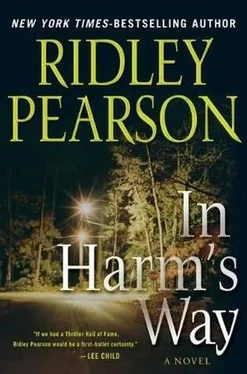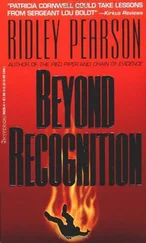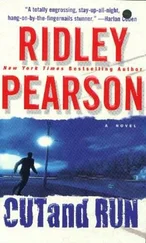Nancy had stayed late as well, without any discussion. She arrived at Walt’s side carrying a piece of paper in her right hand, and Walt knew what it was without asking. On this day there was only one piece of paper, one piece of information, that would bring her out to the garage in person.
“ALPS?” he called across the garage, his voice reverberating off the corrugated steel roof. Automated Latent Print System.
She nodded. “It’s him,” she said.
Walt churned, an odd combination of dread and relief: pleased that he’d gotten it right, disturbed by the confirmation. Martel Gale.
“Notify Boldt,” he said. “See if he wants to grab dinner.”
Walt couldn’t remember the last time he’d sat down to dinner one-on-one with another guy, never mind that it was a business dinner. Somehow that didn’t matter. It wasn’t political. It wasn’t family. It wasn’t required. He’d chosen to be here.
Boldt was a commanding presence, whether standing over a dead body or sitting across the table at Zou 75, an upscale Asian restaurant on the north end of Hailey’s Main Street. His size accounted for much of it, as did his being easily mistaken for Brian Dennehy, that sense of celebrity that he carried. But more than that, it was the intensity that he radiated, a kind of force field that made even the loudest talker whisper instead, that caused children to stare and adults to speculate on who this person might be.
Walt, accustomed to drawing looks whenever he wore the uniform, knew to ignore the gaping; but with Boldt at the table, he became all the more aware that the two of them were the center of attention.
They waded through the requisite small talk, some sharing about family, their mutual love of the outdoors and Whidbey Island, a place Boldt liked to vacation and where Walt occasionally visited his father. Very occasionally.
“I read the transcript of one of your lectures,” Walt said. “‘The Victim Speaks if You’re Willing to Listen.’”
“Don’t hold it against me. I’m not much of a speaker.”
“I found it interesting, and I have to say I practice most of what you preach.”
“I’ve got nothing new to say, believe me. Rehashing old ideas is all.”
“What does Martel Gale tell us, now that we know it’s him?”
“We covered some good scenarios earlier,” Boldt said. “The watch and the wallet could be a smoke screen, could be for real.”
“Vincent Wynn threatened to kill the man and take his chances with the courts,” Walt reminded. They’d reviewed this during an earlier Skype conversation.
“I have to say it plays several ways when we factor in Caroline Vetta. Maybe Caroline’s killer is dead. Or maybe he’s an easy scapegoat. Or maybe Wynn or Boatwright had their own reasons for taking out Gale that had nothing to do with Caroline. Or maybe it had everything to do with Caroline-that one of them attributed her death to Gale and brought their own brand of justice to the table.”
“We have six pieces of trash that might carry DNA,” Walt said. “That’s discounting the beer and pop cans because they can be so tricky for the lab. Twelve, including the cans.”
“Too expensive to run those without a suspect,” Boldt said.
Walt shrugged, not sure he wouldn’t resort to that at some point. The existence of a national DNA database for felons made it all the more tempting.
“Then there’s your B-and-E’s,” Boldt said. “The possibility this guy ran into the wrong guy in the woods.”
“We should conclude our canvassing tomorrow,” Walt said. “Maybe we pick up something. And our plea to drivers will be on the morning news. There’s a good chance someone saw something. It’s a busy highway. But I’m not holding my breath.”
“You want to sit in on my interview with Wynn tomorrow, it’s fine with me.”
“Appreciate it. Let’s see about that. We’re withholding Gale’s identification. I’d like to keep that quiet for a day or two, which would allow you to interview both Boatwright and Wynn without them the wiser. Maybe I’ll accompany you-drive you-and talk to some of his neighbors. With that threat he made, made to my face, it would be irresponsible not to pursue. But the interview is yours. Gives you the upper hand.”
“If you change your mind.”
“Thanks.”
“The tire tracks?”
“The tread is being cross-referenced. We got some markers on one of the right-side tires: if we find the truck we can tie it to the scene, but we’re a long way from pulling a sales receipt and identifying a suspect. A long way.”
They worked through their entrées. Boldt ordered a glass of milk, and as it arrived drew more curious looks from the neighboring tables. Walt had a second beer.
“What am I missing?” Walt asked. “What am I not doing that you would do?”
“I’m not looking at this critically,” Boldt said.
“But if you were?”
“But I’m not. Listen, I respect jurisdiction, believe me. That work you did on that dirt driveway? I couldn’t have done that. You’re better at this than I am.”
“False modesty aside, anything else occur to you?”
Boldt ate some more of his teriyaki chicken and pushed aside the pickled seaweed. “I work with a criminal psychologist, a woman named Daphne Matthews who has a way of drilling down into a victim along the same lines I do, but all from inside the head instead of the evidence. A case like this, with so many moving parts, the possible relationship to Caroline Vetta, the complication with Wynn’s threat… If it was in my house, I’d bring her in and have her work up Gale. She’s been working Vetta since that happened, and maybe she’d pick up an overlap. Who knows? But in terms of police work-the grunt stuff-I’m right with you so far. I wouldn’t lose sight of that nursery, though, like you. It move down my list, especially with limited manpower and resources.”
“Can we ask her to look into Gale, or is that something I shouldn’t ask?”
“It relates to Vetta as far as I’m concerned. I can ask her to do that. Absolutely.”
“I’ve only worked with a profiler a couple of times, and only once when I had a suspect in custody.”
“She’s not a profiler. Not exactly. What’s interesting about Matthews is she’s able to tell you who the victim was, where the victim was emotionally in and around the death. She can run a background on a suspect and give you a percentage of probability that’s uncanny. She has a heck of a track record.”
“All of that would help.”
“Yeah, it couldn’t hurt.”
“You’ll make the call?”
“I will,” said Boldt.
“You ought to try the seaweed,” Walt said. “It’s way better than it looks.”
“Not a chance,” Boldt said, sipping the milk and savoring it as if a fine wine.
“You don’t look comfortable,” the woman said.
Fiona glanced around the office at the medical school degrees, the photos of views from several different mountain peaks-her eye critical of the photography.
“I’m not.”
“You’ve been to counseling before?”
“I have. A few years ago. It wasn’t fun.”
“This isn’t then,” the woman cautioned. She was small and thin and her gray hair was cut like a man’s. For an instant Fiona wondered about her sexual orientation, then wondered why she would think such a thing.
“The thing is… It’s just that there’s this blank spot and I want it back. I thought everything would come back within a day or two.”
“Sadly, no. Head injury can affect memory, both short term and long term. I define short term as the past thirty minutes. Even though only a little over a day, the blank spot you’re talking about would be considered long term.”
Читать дальше












